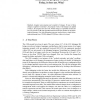Free Online Productivity Tools
i2Speak
i2Symbol
i2OCR
iTex2Img
iWeb2Print
iWeb2Shot
i2Type
iPdf2Split
iPdf2Merge
i2Bopomofo
i2Arabic
i2Style
i2Image
i2PDF
iLatex2Rtf
Sci2ools
ESEC
1999
Springer
1999
Springer
Yesterday, My Program Worked. Today, It Does Not. Why?
Imagine some program and a number of changes. If none of these changes is applied (“yesterday”), the program works. If all changes are applied (“today”), the program does not work. Which change is responsible for the failure? We present an efficient algorithm that determines the minimal set of failureinducing changes. Our delta debugging prototype tracked down a single failureinducing change from 178,000 changed GDB lines within a few hours. 1 A True Story The GDB people have done it again. The new release 4.17 of the GNU debugger [6] brings several new features, languages, and platforms, but for some reason, it no longer integrates properly with my graphical front-end DDD [10]: the arguments specified within DDD are not passed to the debugged program. Something has changed within GDB such that it no longer works for me. Something? Between the 4.16 and 4.17 releases, no less than 178,000 lines have changed. How can I isolate the change that caused the failure and make GDB wor...
| Added | 04 Aug 2010 |
| Updated | 04 Aug 2010 |
| Type | Conference |
| Year | 1999 |
| Where | ESEC |
| Authors | Andreas Zeller |
Comments (0)

